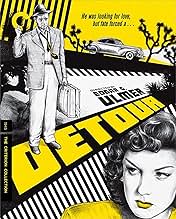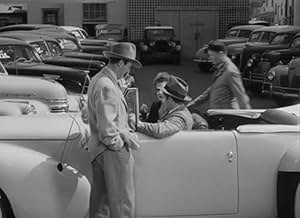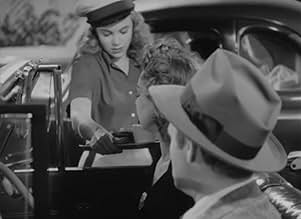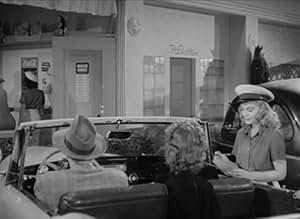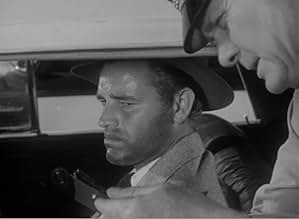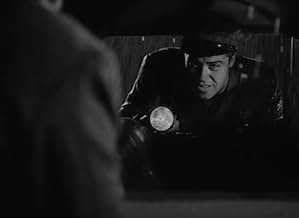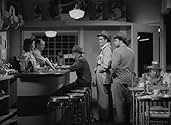A vida de Al Roberts, pianista de uma boate nova-iorquina, se transforma em um pesadelo quando ele decide pegar carona até Los Angeles para visitar a namorada.A vida de Al Roberts, pianista de uma boate nova-iorquina, se transforma em um pesadelo quando ele decide pegar carona até Los Angeles para visitar a namorada.A vida de Al Roberts, pianista de uma boate nova-iorquina, se transforma em um pesadelo quando ele decide pegar carona até Los Angeles para visitar a namorada.
- Direção
- Roteiristas
- Artistas
- Prêmios
- 1 vitória no total
- Used Car Salesman
- (não creditado)
- Cop
- (não creditado)
- Tony - Used-Car Lot Mechanic Inspecting Car
- (não creditado)
- Nightclub Patron
- (não creditado)
- California Border Patrolman
- (não creditado)
Avaliações em destaque
The story feels more than a little strained on more than one occasion. It's hard not to fall in love the hopelessness that constitutes Detour. A low-budget thriller directed by Edgar G. Ulmer. Sure, it's an extremely simple B-movie, but it is packed full of interesting quotes, friendly cynicism, pitch black darkness and at least as much rain. It is insanely entertaining to see Vera and Al throw sharp barbs at each other while the tones are so miserable that they find it hard to laugh at them.
With a playing time of over 70 minutes says Detour goodbye long before it has time to start to feel tiring.
The characters in "Double Indemnity," "Body Heat," or "The Talented Mr. Ripley" do not think of themselves as bad people. They believe they are forced into their crimes by the world, which is the essential difference between crime movies and noir. As pointed out by Roger Ebert: "the bad guys in crime movies know they're bad and want to be, while a noir hero thinks he's a good guy who has been ambushed by life."
"Detour" is told through the central character, Al Roberts, who recalls his story as one made through impossible coincidences and horrible luck. But there is something not right about his story. The audience can pick out the incongruities and flaws as soon as they're told. Was Charles Haskell's death really the result of bad luck or simply a murderer trying to convince himself that it was? We wonder if it is possible that a person as innocent as Al says he is can be forced into such immoral activities. However, the explanation is quite clear. Al is retelling the story not as a true confession but as a man reviewing his defense to the police.
Watching the movie, I was reminded of Tanazaki's "The Key," a novel in which the main character deliberately lies to the audience as a way of reaching the story's conclusion. We do not see a real conclusion to "Detour," but we sense that the police will find the same flaws in Al's story as we do. And that is not a fatal form of story-telling but a way of looking into the mind of a true noir character and seeing the darker depths of his soul. That is why film noir is so haunting and why this movie is so definitive in its genre.
The acting and much of the dialogue is very melodramatic, bordering upon soapy, but it fits the story as so much of it involves conveying the emotion and doing so from the point of view of Al. Bogart and Mitchum wouldn't have been right for this lead role. Either one of them would have come across as either too cool or too tough to put up with such a domineering femme fatale as Ann Savage's Vera and seem so depressed and pathetic. Instead, Tom Neal is perfect as a guy who sees himself bound by fate and doomed.
But maybe the entirety of the story is made up. Al's voice over could just be him sitting in the cafe creating an alibi story. Ann Savage's performance as Vera was over the top maybe because it's Al telling the story, and he wants to make himself look good. I don't buy half of what he tells us; I think he was much more complicit in all of the deaths than he wants the audience to believe. Vera is a caricature of the noir femme fatale because he's trying to convince us that everything was her idea or an accident or fate based on his act of true love - trying to get to his girl in California - and he's completely innocent.
On the technical side, this one showed a great use of light, shadows, and music, and fine direction by Ulmer to keep the mood. It's too bad nobody has restored this one as it resides in the public domain. This is one noir that will stay with you.
What makes "Detour" a must see, is the clever way its narrative unfolds on the screen. Al and Sue are seen first in the small bistro he plays the piano and she sings, in Manhattan. Sue sings a happy rendition of "I Can't Believe You're in Love with Me", and Al shows he can improvise on a theme by Chopin as he jazzes it up. When Sue decides to pack it and move to L.A., Tom promises he'll follow. The tragic mistake he makes is to intent crossing the country hitchhiking. Even in the forties, it's a miracle he made it alive!
In Arizona Al meets the kind Charles Haskell, who happens to be going all the way to L.A. and offers him a ride. The two men develop an easy friendship until the point when Haskell dies of an apparent heart attack. Al disposes of the body and keeps going, assuming now, Haskell's persona. At the nearest gas station he sees a pretty woman, Vera, who appears is hitchhiking, and offers her a ride. This will prove to be his biggest mistake.
Vera turned out to be Al's worst nightmare. She knows Al is not Haskell since she, herself, knows the man. Al ends up a virtual prisoner hiding in the apartment they have rented in Hollywood. He can't escape. When Vera realizes there's a lot of money to be made by having Al pretend to impersonate the dead Haskell, he refuses. She threatens to call the police and he is left on the other room pulling the telephone cord...
The film works because all the elements are in place in this satisfying 67 minutes work and because of the great performances Mr. Ulmer got out of Tom Neal and Ann Savage. Edmund MacDonald and Claudia Drake played Haskell and Sue.
"Detour" was shot in two sets and it shows. It's a small film that doesn't pretend what it's not, and that's basically why audiences seem to like it as it's discovered.
The film is directed by THE BLACK CAT director Edgar G. Ulmer in much the same way he would direct one of his horror pictures. Tom Neal makes for a rather unlikeable hero, trying desperate to hitch-hike from one end of the country to the other and coming unstuck when he falls in with a seemingly friendly driver. He takes a chance and thinks he's made it when in fact he's just about to meet Ann Savage's Vera.
Savage is the stand-out feature of this film and I hated every element of her angry, vengeful, selfish character. She's the worst femme fatale I've ever seen, a noxious character utterly devoid of redeeming features, to the degree that I found the movie hard to watch whenever she was around (which is most of the time). I admit that I thought the climax was excellent given what's come previously, although the only thing I came away from this feeling was relief, relief that it was over.
Você sabia?
- CuriosidadesWhile the crew was setting up to film a hitchhiking scene, a passing car tried to pick up Ann Savage (made up to look dirty and disheveled), causing the crew to break out laughing.
- Erros de gravaçãoIn the first shots of Al hitchhiking, the film is reversed. The cars are driving on the wrong side of the highway and the drivers sitting behind the wheel are sitting on the right side of their vehicles.
- Citações
Al Roberts: Money. You know what that is, the stuff you never have enough of. Little green things with George Washington's picture that men slave for, commit crimes for, die for. It's the stuff that has caused more trouble in the world than anything else we ever invented, simply because there's too little of it.
- ConexõesEdited into Michael Jackson: This Is It (2009)
- Trilhas sonorasI Can't Believe That You're in Love with Me
(uncredited)
Written by Jimmy McHugh and Clarence Gaskill
Performed by Claudia Drake
Played often in the score
Principais escolhas
Detalhes
- Data de lançamento
- País de origem
- Centrais de atendimento oficiais
- Idioma
- Também conhecido como
- Detour
- Locações de filme
- Virginia Street, Reno, Nevada, EUA(In rear projection shot in opening scene, the Reno Arch is seen through the car's rear window.)
- Empresa de produção
- Consulte mais créditos da empresa na IMDbPro
Bilheteria
- Orçamento
- US$ 30.000 (estimativa)
- Faturamento bruto nos EUA e Canadá
- US$ 16.172
- Fim de semana de estreia nos EUA e Canadá
- US$ 5.127
- 2 de dez. de 2018
- Faturamento bruto mundial
- US$ 16.172
- Tempo de duração1 hora 6 minutos
- Cor
- Proporção
- 1.37 : 1
Contribua para esta página


![Assistir a Trailer [OV]](https://m.media-amazon.com/images/M/MV5BZGEyYTUwNDQtN2ZjZi00YmY2LWE2ZjUtOTY3NjQ3NDQ0Zjg3XkEyXkFqcGdeQXRyYW5zY29kZS13b3JrZmxvdw@@._V1_QL75_UX500_CR0)
